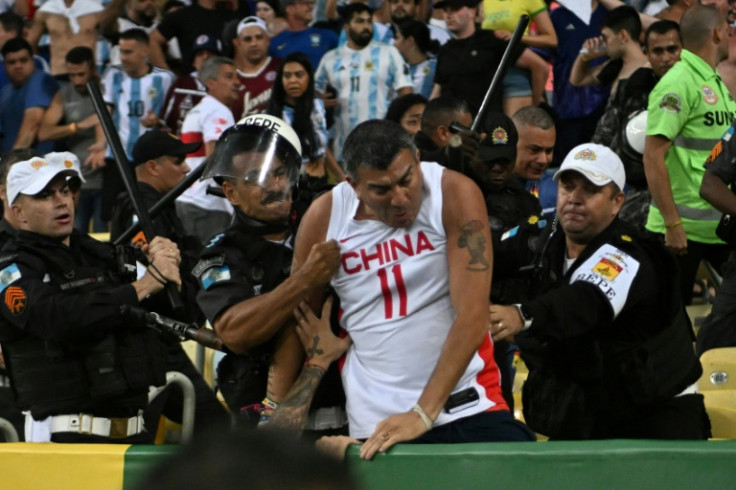Brawl Erupts Between Argentina, Brazil Fans During World Cup Qualifier
Brazilian police were seen hitting Argentina fans with batons in order to break up the fight, leaving several people injured and bloody.

There were some disturbing scenes that emerged from the stands at the Maracana Stadium in Rio de Janeiro, Brazil on Tuesday ahead of the FIFA World Cup Qualifer between Brazil and Argentina. A brawl broke out in the stands between local and visiting fans while the national anthems were being played ahead of the kick-off.
Brazilian police responded immediately to break up the altercations between the fans, but it soon turned even more violent. Police could be seen attacking Argentina supporters with batons even as many of them were already trying to move back. Some Brazilian fans could be seen grabbing weapons from the police in order to violently attack the visiting fans.
In response, some Argentina fans ripped off seats and threw various objects in order to get the police to back off. Even Argentina goalkeeper Emiliano Martinez was seen trying to hold back the police from attacking the Argentina supporters.
Dibu clashes with the Brazilian police who assault fans 🔥🇦🇷
— Fahim (@GOATLeooooMessi) November 22, 2023
pic.twitter.com/7PDsrcNhsy
Some people ended up spilling out into the pitch as they avoided the chaos in the bleachers. One Argentina fan was left with an injury to his head and was bleeding profusely by the side of the pitch before he was stretchered away by the stadium's medical staff.
Argentina captain Lionel Messi and his teammates tried to reason with the crowd and the police, but they eventually made their way into the locker rooms. The World Cup-winning captain lamented how the Argentina fans were injured in the violence, which is something that has become commonplace during many football games in Brazil.
"We saw how they were hitting the people, again repressing the people," Messi said while talking to reporters by the pitch. "It already happened in the Libertadores final. We went to the locker room because it was the best way to calm everything down, it could have ended in tragedy."
He was speaking about how Brazil's Fluminense defeated Argentina's Boca Juniors at the Copa Libertadores final on November 4 at the Maracana Stadium. Numerous street fights broke out between the fans of the two clubs in the week leading up to the final.
This actually very sad. Unacceptable from Brazil!! pic.twitter.com/mJt5Zawb5z
— Zack🥷🏿 (@HazardXMessi10) November 22, 2023
Messi added that some of the players had family members in the stands, which was even more reason for them to worry. Eventually, the match was delayed for a total of 27 minutes after the Argentina squad decided to retreat to the dressing room. They waited for the situation to calm down before coming back out to play the match.
"We did that (going to the locker room) because that was the way to make it all calm. From below, we couldn't do much, we saw how they (police) hit people," he added.
The police managed to confine about 3,000 Argentina fans in a section of the stands before it was finally deemed safe for the match to proceed. Dozens of officers had to stand between the fans from opposing sides, who were unfortunately seated right next to each other. Several more officers stood by the pitch facing the fans in an effort to keep an eye out for any mischievous behaviour.
Argentina managed to secure a narrow 1-0 victory thanks to a goal from Nicolas Otamendi in the 63rd minute. The loss obviously caused Brazil fans to become even more agitated. The Argentina squad stayed on the pitch to celebrate with their fans long after the final whistle, when they were finally escorted safely down the tunnel and into the dressing rooms.
🚨🇧🇷🇦🇷 Crazy scenes in the stands at Maracanã between Brazilian police and Argentina fans.
— Fabrizio Romano (@FabrizioRomano) November 22, 2023
Full footage by @_igorrodrigues 🎥 pic.twitter.com/lF4uzyI8A9
Meanwhile, Col. Vagner Ferreira, the highest-ranking police officer in charge at the venue, said that the organisers failed to put a barrier between the hosts and the visitors, especially in a match between two fierce rivals.
The Brazilian police was heavily criticised after numerous videos emerged of them hitting unarmed Argentina fans with batons. He defended the police response by saying: "Every action demands a reaction. There is a history of confrontation here. At first we spoke to them. Then, we had to use our batons. There was no lethal force involved, no rubber bullets, no tear gas. This was a very technical approach."
It was a sold out stadium which has a seating capacity of 69,000. Only a very small percentage of Argentina fans were present, which gave the home supporters a lot of confidence to jeer at Messi and his teammates.
Argentina leads South American World Cup qualifying with 15 points from six games. Brazil is in sixth position.
© Copyright IBTimes 2024. All rights reserved.






